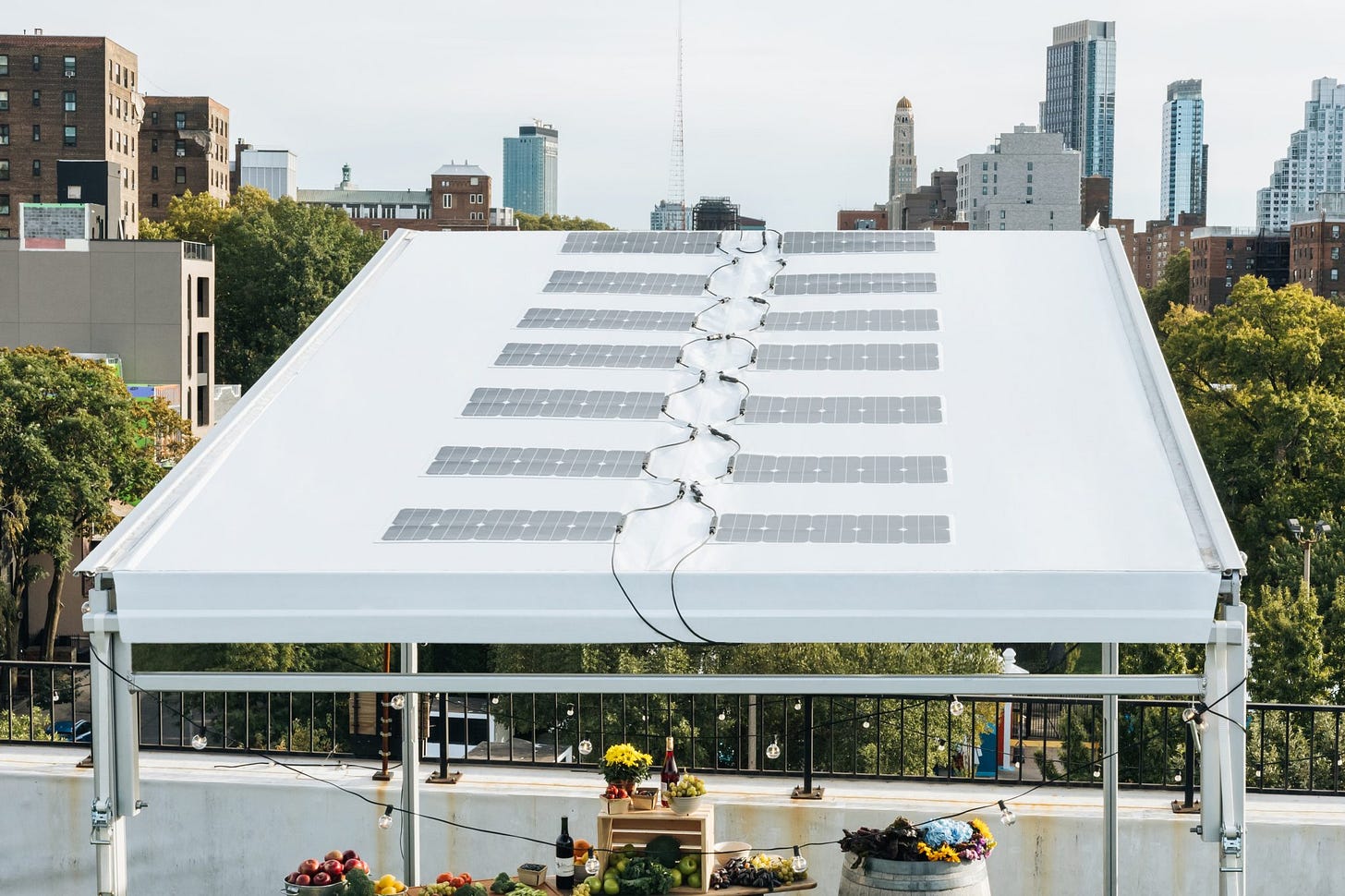Another day in the life of the climate fight.
September 12, 2023 | BILL MCKIBBEN | The Crucial Years Newsletter
We are truly in the midst of the climate battle now, all around the world, with new developments daily in the ongoing fight between activists who want to speed up the transition to clean energy and the fossil fuel industry that wants to slow it down. I spend much of the day trying to help in some small way in that battle: today it meant a couple of press conferences, some pressuring of corporate execs, working with my colleagues at Third Act, talking with colleagues in Africa and Europe. But it occurred to me that the very banality of a day like this hides the extraordinary ebb and flow of events. So here’s just a few of the things that happened on some of the various fronts today:
If this newsletter seems useful to you, consider supporting it via the modest and voluntary subscription fee. Not because you have to—it will always be free to all—but because it helps. Thank you.Subscribe
In California, SB 253 made it through the legislature, which is an incredibly big deal. Because California is the fifth largest economy on earth, and this law would force the big companies that do business there—which is everyone, really, because who is going to miss out on that economy?—to fully disclose their carbon emissions, including their “Scope 3” emissions, which are the ones that come from the supply chain. Before the bill could pass it had to overcome huge lobbying by the Chamber of Commerce and the fossil fuel industry—they know that if companies like, say, Google are required to report, say, the carbon that comes from their banking arrangements with Chase or Citi, then Google will start putting pressure on those banks to stop lending to Exxon and Chevron. Enormous thanks to the legislators and activists who pushed—and who now must push Gavin Newsom to actually sign the law. He talks an excellent climate game, but rest assured there will be enormous pressure on him here. The Sierra Club’s executive director Ben Jealous called on Newsom to sign, and added that the “Securities and Exchange Commission should join California, the European Union, and other jurisdictions in taking a comprehensive approach to requiring the disclosure of all emissions and major climate risks.”
To understand why this is so important, consider Apple’s new product launch today, which featured a quite wonderful environmental skit starring Apple boss Tim Cook and his sustainability vp Lisa Jackson (former head of the EPA), playing opposite Octavia Spencer as Mother Nature. It was part of the company’s announcement that their Apple Watches were now carbon-free—a real accomplishment in metallurgy, fabric science, and so on. But also not quite true, because Apple’s biggest source of carbon emissions is the money it keeps in America’s banking system, which is lent out for new pipelines and the like. When you count those emissions, Apple’s carbon footprint goes up 64 percent. And SB 253 will make them count those emissions—and I have no doubt that their teams will then get to work reducing them, by pressuring the (much smaller in corporate terms) megabanks to stop bankrolling fossil fuel expansion. If you’re the head of Chase, and Tim Cook says ‘bro, we cannot meet our promise to be net zero by 2030 if you don’t change,’ then you have precisely the kind of problem that’s necessary for progress.
+A loss—partial, and smaller—across the country in New York. The city is getting ready to enforce a law that requires landlords to retrofit their buildings to reduce carbon emissions; the city’s landlord class opposes it, and they apparently have enough political clout to sway the city’s mercurial mayor Eric Adams, who today proposed a series of loopholes to weaken the law. Groups like New York Communities for Change and Food & Water Watch called it “a huge gift to New York’s top corporate polluters — the real estate lobby, who are his largest campaign donors. If his proposed rules are adopted, New Yorkers could lose tens of thousands of jobs, air pollution could increase by millions of tons per year, and energy bills could get even higher because landlords will be allowed to avoid upgrading their dirty, polluting buildings to high energy efficiency.”
Just as the California fight isn’t over till Newsom signs the bill, so the New York one isn’t done yet either. And in both cases success depends on activism, which is why it was sweet to see a tweet first thing in the morning from the New York University chapter of the Sunrise Movement disclosing that NYU has finally divested from fossil fuels. This battle has been going on for a decade—I’ve watched many remarkable students and faculty push hard, with sit-ins and petitions and all the tools of the activist toolkit. The administration has been absurdly resistant—back in 2016, after a faculty vote for divestment, it said it would be “disingenuous” to sell oil stocks while the campus was still using oil, which is Twitter-level political analysis. But the kids kept coming, and today it was victory.
And, also today, it was terrible, heart-rending defeat. Record rainfall in Libya—the kind of rainfall you get when you heat the ocean and the atmosphere—overwhelmed two dams. At least five thousand people are dead, and since ten thousand are missing that number will keep rising. Nothing we do will prevent tragedy at this point; but if we do all we can, then there will be less tragedy. That’s the calculus of this day, and every day, on our overheating earth.
In other energy and climate news:
+In late August Eucadoreans voted overwhelmingly to keep the oil beneath the Yasuni National Park in the ground. That’s about 726 million barrels, no small thing, and it should shame rich countries of the north that can’t bring themselves to do the same.
The oil industry is a global, interconnected industry. Much of the oil exploited in Yasuni for example is taken to the United States; in California, one out of every nine tanks of gasoline is filled with oil from the Amazon. Resistance to global corporations and the powers of greed, is only possible through global movements, countering these powers and protecting their territories of life. Our collective power to confront the oil industry is in unity;the frontlines lead, but are supported by national and global solidarity. To win this historic victory, Indigenous and non-Indigenous activists and organizations joined forces, coordinating mobilizations, assemblies and eye-catching digital campaigns. Over the last month, the campaign gathered international support and recognition from international celebrities such as Leonardo DiCaprio, Mark Ruffalo, Greta Thunberg, Jada Pinkett Smith, Jason Momoa, Gael Garcia Bernal, among others. This vote shows that when we come together, and are creative in our collaborations, we win. When we build bridges across divisions, we are unbreakable.
+Nifty account by Liza Featherstone in In These Times about how New York state activists won the legislative battle to “put the publicly owned New York Power Authority in charge of building renewable energy with a mandate to do so in the interest of working people” instead of leaving it up to private utilities:
The New York power campaign canvassed in neighborhoods suffering unreasonably high electric rates and the fallout of climate disasters. The devastating 2019 blackout in New York City left many stranded in elevators and subways, which revealed — according to Amber Ruther, then an NYC-DSA member who was part of the early organizing— that ConEd, a for-profit company with a monopoly, “didn’t have the incentive to invest in even basic grid maintenance.” Public power advocates argued that the government, without the profit motive and with democratic oversight and obligation, could do a better job.
The campaign also held town halls in affected neighborhoods. It turned out that ConEd had kept the lights on in wealthy areas but had cut off power in working-class Black communities like Flatbush. Ruther recalls “a lot of righteous anger from the community about those blackouts” during town hall events. As one Flatbush resident interviewed for a DSA video put it, “Why are we always in the dark?”
Meanwhile, Brooke Anderson in Yes about the unlikely and inspiring story of the Shelterwood Collective, bringing a solar-powered microgrid to thier part of northern California:
“Shelterwood centers queer and trans folks in ecology. It means a lot—returning to home—especially in a community in which we’re ostracized into the margins or forced into the cities for protection,” says Layel Camargo, co-founder and co-executive director of Shelterwood, and an Indigenous (Yaqui and Mayo of the Sonoran Desert), trans organizer and cultural worker. “We’re returning our people back to the land.”
But Shelterwood is in the heart of Northern California’s wildfire country, Camargo explains. When it’s hot and windy, PG&E turns off the power without warning. This is a problem for Shelterwood, which sits outside of cellular service and relies on electricity to power satellite phones. Shelterwood also depends on power for their housing, kitchen, retreat center, phones, lights, internet, electric vehicles, and electric tools.
“Rural communities are really at the hands of these monopolized energy companies. In an emergency, without power, we couldn’t call 911. There’d be no way to get information about an evacuation,” Camargo says. “The best way for us to survive out here, and to stay ecologically aligned, is to have as much control of our utilities as we can.”
+Wyoming is the biggest coal state in the union, but by the time the Transwest transmission line is finished, it could be a clean energy powerhouse
+Definitely read Naomi Klein’s new book, released today. The craziness that she describes settling over our global politics is driven in no small part by climate denial, which became a template for covid denial.
+Not just New York—climate marches all over the country and the world this weekend. Paul Hockenos writes from Berlin, where his son is skipping school to march:
In discussion, and on the TV and radio talk shows, the young people quake with indignation. They talk passionately of a system that is wrecking their future and which they — ineligible to vote — have no say in. They talk about “taking back their future.”
They’ve opted for the school strike and other forms of civil disobedience because the decisions directly affecting their lives are made over their heads — and often it seems for the worse. As they say, they’re the ones most affected in the long term — and yet, in many cases, their young age means they’re not even able to vote.
The way they can be heard is to take to the streets. And doing so on a school day packs an even harder punch — that’s civil disobedience.”
+Solar fabric from a company called Pvilion is being used in war relief in the Ukraine—and also in canopies for cocktail parties in New York. Solar everywhere!

And since we’re talking appropriate technology, check out a great new film on the burgeoning sail cargo movement.
+Teen Vogue, always on the case—this time reminding us that our banks and credit cards are huge sources of emissions.
That’s why climate activists are increasingly turning their attention to big banks as part of their efforts to prevent more carbon from entering the atmosphere. “We wouldn’t have things like the Willow Project or Line Three” — an oil drilling project in Alaska and a pipeline from Canada to Wisconsin, respectively — “if we didn’t have these big banks underwriting them by lending them all this money,” said Cathy Becker, responsible finance campaign director for Green America, a nonprofit.
+A fascinating Rural New Deal proposal, from Progressive Democrats of America, with some focus on energy, and a full suite of smart proposals for turning around some of the things that have turned the countryside bitter.
To view the original source, click here.
 news + press
news + press
